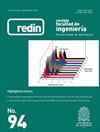显式管道摩擦系数方程:评价、分类和建议
IF 0.5
Q3 ENGINEERING, MULTIDISCIPLINARY
Revista Facultad De Ingenieria-universidad De Antioquia
Pub Date : 2023-10-09
DOI:10.17533/udea.redin.20230928
引用次数: 0
摘要
已使用Colebrook方程来估计湍流流体中的摩擦系数(f)。在这方面,已经提出了许多方程来消除Colebrook方程的迭代过程。本文的目的是对水力工程的摩擦系数进行评价、分类和建议,以便更好地开发水力工程。本研究采用基因表达编程(Gene Expression Programming, GEP)、Newton-Raphson和Python算法。采用最大相对误差(∆f/f)、百分比标准差(PSD)、模型选择标准(MSC)和赤池信息标准(AIC)进行准确性和模型选择。在评估的30个方程中,Vatankhah方程最准确,最容易获得摩擦系数,其分类为很高,达到∆f/f<0.5%和1.5<PSD<1.6。建立了新的方程,得到了显式f,收敛速度快,精度高。结果表明,GEP、误差理论和选择准则的结合提供了一个更可靠、更强的模型。本文章由计算机程序翻译,如有差异,请以英文原文为准。
Explicit pipe friction factor equations: evaluation, classification, and proposal
The Colebrook equation has been used to estimate the friction factor (f) in turbulent fluids. In this regard, many equations have been proposed to eliminate the iterative process of the Colebrook equation. The goal of this article was to perform an evaluation, classification, and proposal of the friction factor for better development of hydraulic projects. In this study, Gene Expression Programming (GEP), Newton-Raphson, and Python algorithms were applied. The accuracy and model selection were performed with the Maximum Relative Error (∆f/f), Percentage Standard Deviation (PSD), Model Selection Criterion (MSC), and Akaike Information Criterion (AIC). Of the 30 equations evaluated, the Vatankhah equation was the most accurate and simplest to obtain the friction factor with a classification of very high, reaching a value of ∆f/f<0.5% and 1.5
求助全文
通过发布文献求助,成功后即可免费获取论文全文。
去求助
来源期刊
CiteScore
2.00
自引率
0.00%
发文量
27
审稿时长
2 months
期刊介绍:
Revista Facultad de Ingenieria started in 1984 and is a publication of the School of Engineering at the University of Antioquia.
The main objective of the journal is to promote and stimulate the publishing of national and international scientific research results. The journal publishes original articles, resulting from scientific research, experimental and or simulation studies in engineering sciences, technology, and similar disciplines (Electronics, Telecommunications, Bioengineering, Biotechnology, Electrical, Computer Science, Mechanical, Chemical, Environmental, Materials, Sanitary, Civil and Industrial Engineering).
In exceptional cases, the journal will publish insightful articles related to current important subjects, or revision articles representing a significant contribution to the contextualization of the state of the art in a known relevant topic. Case reports will only be published when those cases are related to studies in which the validity of a methodology is being proven for the first time, or when a significant contribution to the knowledge of an unexplored system can be proven.
All published articles have undergone a peer review process, carried out by experts recognized for their knowledge and contributions to the relevant field.
To adapt the Journal to international standards and to promote the visibility of the published articles; and therefore, to have a greater impact in the global academic community, after November 1st 2013, the journal will accept only manuscripts written in English for reviewing and publication.
Revista Facultad de Ingeniería –redin is entirely financed by University of Antioquia
Since 2015, every article accepted for publication in the journal is assigned a DOI number.
联系我们:info@booksci.cn
Book学术提供免费学术资源搜索服务,方便国内外学者检索中英文文献。致力于提供最便捷和优质的服务体验。
Copyright © 2023 布克学术 All rights reserved.
京ICP备2023020795号-1
 京公网安备 11010802042870号
京公网安备 11010802042870号
京ICP备2023020795号-1

Book学术文献互助群
群 号:604180095


 求助内容:
求助内容: 应助结果提醒方式:
应助结果提醒方式:
